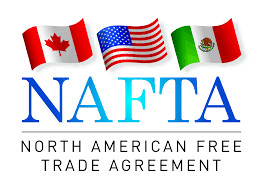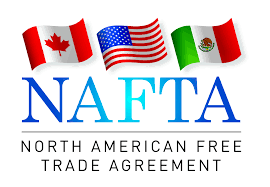
The contentious proposal to ramp up regional content for autos put forward by the United States resulted in a stalemate in the negotiators between the U.S., Mexico and Canada, representative of which had gathered to talk about the fate of the North American Free Trade Agreement, for the last time in the fifth round.
It is being reported that Mexico and Canada have set their minds on opposing the U.S. demand to enhance the minimum requirement for including auto parts form the U.S. from 62.5 percent to 85 percent in the NAFTA autos agreement in addition to demanding halving of the content from the United States.
Despite the fact that the auto industry has been opposing the proposal and questioning the viability of the project, this proposal is very close to heart for U.S. President Donald Trump’s America First strategy and his attempts to get back manufacturing jobs to the United States.
Mexican and Canadian officials have previously repeatedly stated that there is no chance of them countering the U.S. proposal with the counter proposal but they also would demand an explanation from the U.S. about the manner that this proposal would be able to bring prosperity to the auto industry given the skepticism surrounding it.
Despite such extreme positions that have reportedly been taken by the representative of the three countries, negotiators are sit hopeful that they would be able to make some announcements that would indicate forward movement and be able to inject some sort of momentum into the negotiations process, which according to some pessimistic observers, is clearly running w=towards a dead end.
The last round of talks between the countries in October in Washington was rife with confrontation as t heh U.S. had put forward a series of tough demands, that also included the auto plan. But this latest round of talks has been comparatively less confrontational and with a lesser negative tone, said Caroline Freund, a senior fellow and trade expert with the Peterson Institute for International Economics in Washington.
“With U.S. tax reform front and center, the U.S. government really didn’t want to make this a big round, and (wanted) to let the technocrats get on and do the negotiating on the less controversial bits,” Freund said.
At the time before the latest round of talks began, the three countries announced that the respective ministers in-charge of the NAFTA trade portfolio would not be attending the talks and this has caused a set back to the expectations that this round of talks would end in some form of major advances. And as time has gone by, progress has been repeatedly halted.
In March of 2018, Mexico will see the beginning of the campaigns for the Presidential elections there and the three countries have agreed that the talks on renegotiating the NAFTA would be continued till then.
Negotiators and the countries also do not intend to allow NAFTA talks to become a political tool for the Mexican elections and the election campaign.
For issues related to industries such as telecoms and e-commerce, there was hope by the Mexican officials initially, that this fifth round of talks would be able to finally closed some of the chapters related to such issues. However, there is still very little evidence of anything of that sort.
(Source:www.reuters.com)
It is being reported that Mexico and Canada have set their minds on opposing the U.S. demand to enhance the minimum requirement for including auto parts form the U.S. from 62.5 percent to 85 percent in the NAFTA autos agreement in addition to demanding halving of the content from the United States.
Despite the fact that the auto industry has been opposing the proposal and questioning the viability of the project, this proposal is very close to heart for U.S. President Donald Trump’s America First strategy and his attempts to get back manufacturing jobs to the United States.
Mexican and Canadian officials have previously repeatedly stated that there is no chance of them countering the U.S. proposal with the counter proposal but they also would demand an explanation from the U.S. about the manner that this proposal would be able to bring prosperity to the auto industry given the skepticism surrounding it.
Despite such extreme positions that have reportedly been taken by the representative of the three countries, negotiators are sit hopeful that they would be able to make some announcements that would indicate forward movement and be able to inject some sort of momentum into the negotiations process, which according to some pessimistic observers, is clearly running w=towards a dead end.
The last round of talks between the countries in October in Washington was rife with confrontation as t heh U.S. had put forward a series of tough demands, that also included the auto plan. But this latest round of talks has been comparatively less confrontational and with a lesser negative tone, said Caroline Freund, a senior fellow and trade expert with the Peterson Institute for International Economics in Washington.
“With U.S. tax reform front and center, the U.S. government really didn’t want to make this a big round, and (wanted) to let the technocrats get on and do the negotiating on the less controversial bits,” Freund said.
At the time before the latest round of talks began, the three countries announced that the respective ministers in-charge of the NAFTA trade portfolio would not be attending the talks and this has caused a set back to the expectations that this round of talks would end in some form of major advances. And as time has gone by, progress has been repeatedly halted.
In March of 2018, Mexico will see the beginning of the campaigns for the Presidential elections there and the three countries have agreed that the talks on renegotiating the NAFTA would be continued till then.
Negotiators and the countries also do not intend to allow NAFTA talks to become a political tool for the Mexican elections and the election campaign.
For issues related to industries such as telecoms and e-commerce, there was hope by the Mexican officials initially, that this fifth round of talks would be able to finally closed some of the chapters related to such issues. However, there is still very little evidence of anything of that sort.
(Source:www.reuters.com)





